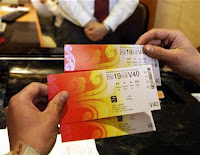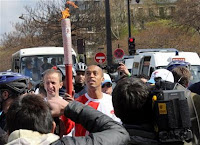
Beijing's 2008 Summer Olympics experienced this past week hints of a possible boycott of some or all of the Games over China's suppression of protests in Tibetan regions against Chinese rule, and the government's support of regimes in Burma and Sudan. German Chancellor Angela Merkel (left) said
she would not attend the Games, joining the leaders of Poland, the Czech Republic and Estonia who have said they won't go. Merkel, who had angered Chinese leaders when she met recently with the Dalai Lama, Tibet's spiritual leader, didn't cite political reasons, but her fellow Christian Democratic Party member Hans-Gert Pötterin, who is chair of the European Parliament, said, "I cannot imagine German politicians attending the opening or closing ceremonies" given the crackdown on pro-Tibet protesters. Polish Prime Minister Donald Tusk said he would stay away from the Aug. 8 opening ceremony because "the presence of politicians at the inauguration of the Olympics seems inappropriate."
British Prime Minister Gordon Brown said he still intends to go to the Games ... although how could he not? London will be the host of the next Olympiad, in 2012, and a snub by him is unthinkable. The no-go statements by the other European leaders have focused attention on French President Nicolas Sarkozy, who said Thursday that
his attendance at the Games would depend on how China deals with the protests in Tibet, which China has called part of its territory since 1951. "We were shocked by what happened in Tibet and we made our great concern known, each in our own way," Sarkozy said after a meeting with Brown.
But, "No one is in favor of a boycott of the Olympic Games (as a whole) ... and regarding the opening ceremony nobody wished to speak about it," French Foreign Minister Bernard Kouchner said during a European Union
meeting this past weekend. Foreign ministers of the 27-member EU met Saturday and Sunday in Slovenia where China's crackdown on protesters in Tibet and neighboring Chinese provinces was on the agenda. A statement by the ministers called "for an end to the violence" and for those arrested to be treated "in accordance with international standards," but there was no mention of any boycott.
This may be a lot of posturing, as the opening and closing ceremonies and the Games themselves are typically only attended by a handful of heads of state or government. The Beijing Games promise to be spectacular though, and the opportunity to be at the center of the known universe during some of those 16 days this August will be hard to resist, so the VIP list will likely grow. George Bush has said repeatedly he will attend the Beijing Games as a spectator and supporter of U.S. athletes, not as a President giving his blessing to any regime or any bilateral relationship. Vice presidents are frequently charged with showing the U.S. flag at such events abroad, such as when Dan Quayle went to the 1992 Winter Games in Albertville, France (I did "the wave" sitting about 30 rows up from Quayle and French President Francois Mitterrand at the opening ceremonies of those Games).
The Washington Post published an
editorial Sunday titled, "Do Olympic Boycotts Achieve Anything?" "Reichs fall, cultures adapt and poor economic models collapse, largely irrespective of protests and boycotts," it said.
Talk of a boycott reminds me of
Jesse Vassallo, one of the world's greatest swimmers that most Olympic fans have never known. Vassallo is around my age and was in my sport, so in the 1970s I was following his career. He was favored to win multiple gold medals at the 1980 Moscow Olympics until President Jimmy Carter boycotted those Games over the Soviets' invasion of Afghanistan. Vassallo, and all Olympians whose governments took part in the boycott had a highlight of their lives and goal toward which they had worked like nothing else yanked out from under them. Vassallo won a couple of races in alternative games in the U.S., where his times for the 200- and 400-meter individual medleys were actually better than the gold-medal times in Moscow, but they were rather hollow victories. What did that boycott actually accomplish? A retaliatory Soviet bloc boycott of the 1984 Los Angeles Summer Olympics. Such wasteful and empty gestures.
While some foreign leaders and other dignitaries -- and even a few athletes -- may choose symbolically to pinch their noses and stay home during the Olympics, I seriously doubt any team (especially with a medal contender) will boycott the 2008 Games. For its part, China will certainly welcome all eligible delegations. In the past China has made an issue out of consorting with diplomats / athletes / journalists / representatives from a handful of countries -- Beijing for instance wouldn't allow reporters from Taiwan, South Korea, Israel and South Africa to be accredited for a visit by then Chinese Communist Party Secretary General Hu Yaobang to Japan in the 1980s. But China has gotten beyond snubbing people because of their passports, and can't wait for the world, and its tourists, and its media, and its money, to come running.
 Many are called; few are chosen. For each athlete who makes it to compete in the Olympics, thousands of others never have that dream realized. But if you can compete in another country's uniform, all the more chances you have of marching in the opening ceremony and possibly even snaring a medal.
Many are called; few are chosen. For each athlete who makes it to compete in the Olympics, thousands of others never have that dream realized. But if you can compete in another country's uniform, all the more chances you have of marching in the opening ceremony and possibly even snaring a medal. 












